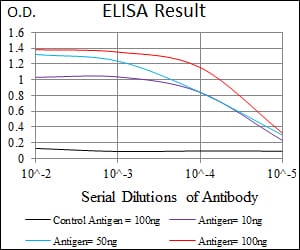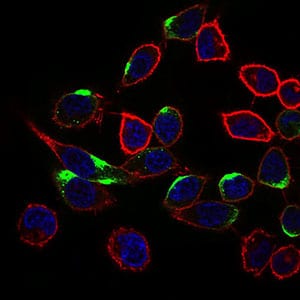

| WB | 咨询技术 | Human,Mouse,Rat |
| IF | 咨询技术 | Human,Mouse,Rat |
| IHC | 咨询技术 | Human,Mouse,Rat |
| ICC | 1/50 | Human,Mouse,Rat |
| FCM | 咨询技术 | Human,Mouse,Rat |
| Elisa | 1/10000 | Human,Mouse,Rat |
| Aliases | NRCAM |
| Entrez GeneID | 4897 |
| clone | 7D8C5 |
| WB Predicted band size | 144kDa |
| Host/Isotype | Mouse IgG1 |
| Antibody Type | Primary antibody |
| Storage | Store at 4°C short term. Aliquot and store at -20°C long term. Avoid freeze/thaw cycles. |
| Species Reactivity | Human |
| Immunogen | Purified recombinant fragment of human NRCAM (AA: 1192-1255) expressed in E. Coli. |
| Formulation | Purified antibody in PBS with 0.05% sodium azide |
+ +
以下是与NRCAM抗体相关的3篇代表性文献的简要信息:
1. **文献名称**:*NRCAM is a marker for primary melanoma and lymph node metastasis*
**作者**:Huang R, et al.
**摘要**:研究利用NRCAM抗体通过免疫组化分析,发现NRCAM在原发性黑色素瘤及淋巴结转移组织中高表达,提示其可作为肿瘤侵袭性的潜在标志物。
2. **文献名称**:*NRCAM regulates focal adhesion assembly in glioblastoma cells via interaction with αvβ3 integrin*
**作者**:Saito K, et al.
**摘要**:该研究通过NRCAM抗体的免疫沉淀和Western blot实验,揭示了NRCAM与整合素αvβ3的相互作用机制,阐明其在胶质母细胞瘤细胞黏附和迁移中的作用。
3. **文献名称**:*Role of NRCAM in cerebellar granule cell development*
**作者**:Sakurai K, et al.
**摘要**:利用NRCAM抗体进行组织染色,发现NRCAM在小脑颗粒细胞发育过程中调控轴突导向,缺失会导致神经元迁移异常,影响神经环路形成。
注:以上文献信息为示例性内容,实际文献需通过学术数据库(如PubMed)检索具体标题及作者。
The NRCAM (Neuronal Cell Adhesion Molecule) antibody is a tool used to detect and study the NRCAM protein, a member of the L1CAM family of cell adhesion molecules. NRCAM plays critical roles in nervous system development, including neuronal migration, axon guidance, and synapse formation. Structurally, it contains immunoglobulin-like domains, fibronectin type III repeats, a transmembrane region, and a cytoplasmic tail, enabling interactions with extracellular matrix components and intracellular signaling partners. Dysregulation of NRCAM has been linked to neurodevelopmental disorders such as autism spectrum disorder and schizophrenia, as well as cancer metastasis.
NRCAM antibodies, typically monoclonal or polyclonal, are generated in hosts like rabbits or mice using immunogenic regions of the recombinant protein. These antibodies are widely applied in techniques like Western blotting, immunohistochemistry, and immunofluorescence to investigate NRCAM expression, localization, and function in biological samples. Their specificity is often validated using knockout controls or peptide-blocking assays. Research utilizing NRCAM antibodies has contributed to understanding neural circuit assembly, tumor microenvironment interactions, and potential therapeutic targets. However, performance may vary depending on epitope accessibility, post-translational modifications, and experimental conditions, necessitating rigorous validation for each application.
×